Update 42
International news
Marketing onslaught on Vietnam
The Associated Press reports that it interviewed dozens of mothers, doctors, health officials and shopkeepers in Vietnam who said that formula companies pay doctors to peddle their products, promote products for infants under age one and approach mothers and health care workers in health facilities — all of which are against the law. AP continues:
The number of Vietnamese mothers who exclusively breast-feed in the first six months — the most crucial period — stands at just 17 percent, less than half what it was a decade ago, according to UNICEF. Meanwhile, formula sales in Vietnam jumped 39 percent in 2008, according to a study by Nielsen, a market research firm. Another survey found that the industry spent more than $10 million on advertising last year, placing it among Vietnam’s top five advertisers.....Health Ministry officials also announced they had uncovered dozens of violations of formula labeling rules.
Multinationals break Vietnam law in formula sales 20.9.09
http://abcnews.go.com/International/wireStory?id=8621684
Self-regulation does not work as a way to limit the extent and impact of marketing. Instead, self-regulatory systems promote trust in advertising among consumers and governments, undermining their resolve to bring in the legislation that is needed to protect health. Under these systems the volume of advertising increases.
Corinna Hawkes, Int.Food Policy Research Institute, Washington
Presentation at the European Platform for Action on Diet and Physical Activity. Feb 2007
The International Pediatric Association issued an interesting statement for World Breastfeeding Week:
“Unfortunately, promotion of breast feeding worldwide continues to be undermined by the unrestrained marketing of formula milks... IPA has been concerned for years that the prominent public image of manufacturers of infant foods implies a relationship with the profession of pediatrics which compromises the IPA commitment to promotion of breastfeeding. In 2007 at its triennial meeting, the IPA Council of Delegates resolved unanimously that the IPA fully subscribe to the Code and encourage its Member Societies to do the same.”
The European Food Safety Authority (EFSA) has detailed rules and guidance on conflicts of interest such as: “As a general principle, any conflict of interest shall be incompatable with the obligations deriving from the function of the chairperson and vice-chairpersons.” But are these rules followed? Was EFSA’s weak opinion on sugar influenced by the Vice Chair of its Carbohydrate Panel, Andreu Palou, who chaired a review on sugar funded by the sugar industry? Albert Flynn, the chair of the Panel that oversees the health claims, also declares financial links with the food industry.
EFSA has a new Working Group on Complementary Feeding due to report by 2010. Some WG members, such as Carlo Agostini, Seppo Salminen and Jean-Louis Bresson, seem to have unacceptable links to the infant feeding industry and several are co-authors of an ESPGHAN paper on Complementary Feeding which reintroduces the concept of complementary feeding from 4-6 months (rather than from 6 months which is WHO/Codex policy and already in place in the UK and many EU countries). If EFSA is to re-examine the 4-6 months recommendation, surely it should be based on a transparent and independent scientific review of evidence (if it exists) that the present six-month recommendation is harmful. The UK National Infant Feeding Survey 2005 indicates that the policy has had a good impact so far, delaying the introduction of solids.
The new Lisbon Treaty should strengthen child rights in the EU. In addition to Article 24 of the EU Charter of Fundamental Rights, the new Article 3 of the Lisbon Treaty means that the EU will have to mainstream children’s rights, ensuring that the ‘best interests of the child’ are taken into account in all relevant policy areas.
European policy setting
The Norwegian Food Safety Authority has prohibited the sale of Mead Johnson’s Nutramigen 2 LGG follow-on formula following two scientific opinions from the Norwegian Scientific Committee for Food Safety (VKM) and using the precautionary principle.1 Nutramigen 2 LGG is classified as a food for special medical purposes so it does not have to have its claims cleared by EFSA. It contains Lactobacillus rhamnosus GG - a ‘probiotic’ strain. VKM is especially concerned about the possible negative long-term effects of using LGG on the micro flora in the gut and on the immune system.
1. In the absence of a scientific consensus that harm would not ensue, the burden of proof falls on those who would advocate taking the action.
- Norway is not a member of the EU but has an agreement to implement EU Directives. The Convention of the Rights of the Child (CRC) is LAW in Norway and its legislation adopted in August 2008 is stricter than the EU Directive in relation to follow-on formula advertising. (Luxembourg bans follow-on milk advertising).
After a 20-month investigation, the European Ombudsman has decided not to uphold our complaint of ‘maladministration’ by the European Commission. We alleged that the Commission had failed to protect public health and had ignored Member States’ obligations to implement the International Code. The Ombudsman’s opinion focuses only on whether the Commission carried out “its tasks” adequately.
“No maladministration has been found as regards the complainant’s allegation that the Commission failed adequately to carry out its tasks in relation to the functioning of the SCoFCAH. Consequently, the complainant’s claim relating to the working methods of the SCoFCAH and expert committees in general cannot be sustained. This does not, however, preclude the complainant from addressing, if she so wishes, a petition to the European Parliament and proposing changes to the Comitology legislative framework.”
The Ombudsman fails to question the Commission’s analysis of the status of the International Code or its importance: “In any case, although the Code was only a recommendation, not an international agreement or convention, and was, therefore, not binding, Directive 2006/141 and other relevant EC legislation have endorsed most of its guiding principles.” see: www.ombudsman.europa.eu/cases/decision.faces/en/4265/html.bookmark
The Ombudsman decision, although disappointing, does imply that there may be merit in changing the way EU laws are formed. It may also have stirred things up a bit. The Commission seems to be responding a bit better to Member States, and in June agreed with the UK’s concerns about bogus claims. It has also started discussions on a revision of the hugely important but invisible PARNUTS Framework Directive.* The Infant Formula and Follow-on Formulae Directive (141/2006/EC) that governs all EU legislation on formulas came about because during the 1980s the European Parliament kept rejecting the Commission’s weak proposals and demanded the implementation of the International Code as a European Directive. Parliament also questioned the scientific basis for including follow-on formulas in the Directive. In 1989 the Commission changed the rules, and created PARNUTs - effectively transferring the power to initiate and finalize legislation on baby foods and specialised foods to the European Commission - an unelected body. Parliament no longer had to be consulted and discussions could take place behind closed doors.
PARNUTs has been a serious fault line which has run through the policy making process in Europe ever since with the Commission invariably putting the needs of industry before its responsibility to protect public health. We are calling for PARNUTS to be scrapped in favour of a more transparent and accountable process.
* Council Directive on Foodstuffs Intended for Particular Nutritional Uses (89/398/EEC)
A major problem is the fact that the EU formula Directive allows companies to add ‘optional’ ingredients, “as the case may be.” This is illogical and risky, especially since the EU Commission has used PARNUTs to argue against pre-authorisation of new ingredients. In our opinion ingredients should only be added when proven to be safe and essential through an independent review of all the evidence (that MUST include independently funded research). They should then be mandatory in all formulas of that type - not promoted, as they are, with claims. (For more about the risks see page 12 and INFACT Canada’s website: www.infactcanada.ca).
EFSA and health claims
The European Food Safety Authority (EFSA) is ploughing its way through thousands of dossiers from companies to evaluate if the health and nutrition claims they wish to use are justified. EFSA will not meet its deadline of January 2010 and there are now calls that the companies who submit incomplete dossiers which waste EFSA’s time should get penalty fines. Alternatively, charges could be made for assessments, but this could threaten the EFSA’s independence.
So far EFSA has issued 540 opinions on adult foods and about 30 on claims for products for infants, young children and mothers. Up until now EFSA has required evidence (but not independent evidence) that a particular ingredient has a particular benefit for a particular population. Because of this approach the vast majority of claims for lipids, galacto-oligosaccharides (prebiotics), probiotics and nucleotides all claiming to help brain, eye, mental and cognitive development or to aid ‘serenity’ and ‘calming,’ have been rejected. This has infuriated industry who at a meeting with EFSA in June demanded more time and opportunity for consultation. Since then EFSA has allowed Danone more time to submit extra confidential evidence on a claim - submitted in January 08 - that “Immunofortis naturally strengthens your baby’s immune system,” This claim has already been rejected by the UK Advertising Standards Authority (see page 10).
Merk challenged a negative EFSA opinion on its claim that synthetic DHA supplements during pregnancy and lactation can benefit eye and brain development. EFSA has since clarified its opinion and approved a general claim about maternal DHA intake. EFSA also approved Mead Johnson’s claim, that its DHA and AHA in Enfamil follow-on formula helps visual acuity even though the Cochrane Review of research on adding such ingredients to formula did not find any benefit.
 This image appears on the Mead Johnson website. As you pull the lever across to the right on the graphic (adding more DHA enriched formula) the toy duck comes more into focus. Similar adverts have been used in adverts in China. Such images are powerful and deceptive and very undermining of breastfeeding
This image appears on the Mead Johnson website. As you pull the lever across to the right on the graphic (adding more DHA enriched formula) the toy duck comes more into focus. Similar adverts have been used in adverts in China. Such images are powerful and deceptive and very undermining of breastfeeding
Although product specific claims will probably not be allowed, this is not really a safeguard. Breastmilk substitutes compete with breast milk which contains over 100 fatty acids and over 130 prebiotics. And supplements for mothers invariably undermine confidence in breastmilk quality. So a claim of any sort will work. Indeed in1996, Hambrecht & Quist Spot Report on the Martek Bio-sciences Corporation said: “Even if Formulaide (DHA/AHA) had no benefit we think that it would be widely incorporated into most formulas as a marketing tool and to allow companies to promote their formula as ‘closest to human milk’.” Martek has cornered the market for its synthetic DHA, which is now added to 90% of US formula. But there also risks. In the US, 98 reports have been made to the Food and Drug Administration of adverse reactions to synthetic DHA enriched formulas - which some call ‘diarrhoea formulas’ and say should carry warnings rather than claims.1 Sadly, EFSA looks only at ‘efficacy,’ leaving risk management to the Committee on Food Chain and Animal Health (SCoFCAH), which decides whether and how a claim should be permitted. EC ratified opinions must be implemented in six months, so by July 2010 claims on the negative list might go.
1. Replacing mother - Imitating Breast Milk in the Laboratory.
www.naturalnews.com/027437_DHA_baby_formula_Martek.html
Follow-on milks
The UK Government position is that follow-on formulas provide no health advantage over breastfeeding or infant formula, (which can only carry claims listed in the Infant Formula Directive (141/2006/EC). So claims on follow-on formulas are not only misleading and deceptive (there is no health advantage) but also contrary to UK policy. (See page 18)
Medicine and the media
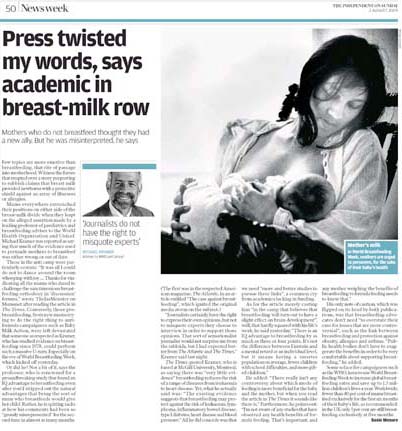 Just before World Breastfeeding Week 2009 a spate of media articles appeared in The Times and many papers across the world, quoting renowned scientist and researcher, Professor Michael Kramer, of McGill University as saying that there was “very little evidence” breastfeeding reduces the risk of a range of diseases from leukaemia to heart disease. Alerted by us, Kramer talked to the Independent on Sunday (IOS) (2.8.09) in an effort to set the straight about his views. He said he had been "grossly misrepresented" and had not expected sensationlist journalism from The Atlantic or The Times.
Just before World Breastfeeding Week 2009 a spate of media articles appeared in The Times and many papers across the world, quoting renowned scientist and researcher, Professor Michael Kramer, of McGill University as saying that there was “very little evidence” breastfeeding reduces the risk of a range of diseases from leukaemia to heart disease. Alerted by us, Kramer talked to the Independent on Sunday (IOS) (2.8.09) in an effort to set the straight about his views. He said he had been "grossly misrepresented" and had not expected sensationlist journalism from The Atlantic or The Times.
Kramer confirmed his view that:
“The existing evidence suggests that breastfeeding may protect against the risk of leukaemia, lymphoma, inflammatory bowel disease, type 1 diabetes, heart disease and blood pressure. There is an IQ advantage to breasfeeding by as much as three or four points. Its not the difference between Einstein and a mental retard at an individual level, but it means having a smarter population on average, fewer children with school difficulties and more gifted children.I am not aware of any studies that observed any health benefits of formula feeding.”
But will this one article counter the hundreds of others?
The UK law is not working - but will anything be done about it
 “I have made a commitment, too, to provide an independently chaired review of the new controls after their first year of operation. As I made absolutely clear to the relevant organisations in our private meetings, the review will play an important role in policy making and in assessing whether the new controls worked as expected. It will assess whether people have found new ways of getting around the rules or whether they are simply not complying with the rules. If the new arrangements are found not to be working, because they have been circumvented or because new methods emerge, the Government will respond proportionately and take the next step of considering further legislative action. We have therefore put robust measures in place.
“I have made a commitment, too, to provide an independently chaired review of the new controls after their first year of operation. As I made absolutely clear to the relevant organisations in our private meetings, the review will play an important role in policy making and in assessing whether the new controls worked as expected. It will assess whether people have found new ways of getting around the rules or whether they are simply not complying with the rules. If the new arrangements are found not to be working, because they have been circumvented or because new methods emerge, the Government will respond proportionately and take the next step of considering further legislative action. We have therefore put robust measures in place.
“Let me make the position absolutely clear: the Government are determined to take tough action to stamp out those practices and to prevent marketing activity that directly or indirectly undermines breastfeeding.”
Dawn Primolo MP, Speaking in Parliament as Minister for Public Health, 16 January 2008, Hansard.
www.publications.parliament.uk/pa/cm200708/cmhansrd/cm080116/halltext/80116h0004.htm
As explained on the previous page, given the undertakings made by the Government Minister in meetings with us, we are extremely disappointed by the draft review report. This ignores the marketing strategies shown in the report we submitted (shown on previous page).
Instead of examining whether breastfeeding is undermined it looked only at whether babies fed on formula are receiving follow-on formula too early. As the UN Committee on the Rights of the Child commented when calling for the Government to implement the minimum international marketing standards, “aggressive marketing of breastmilk substitutes remains common.” (see page 11)
 Here are some examples (all Danone) from the report submitted to the Independent Review Panel. Left: The cover of a Cow & Gate gift pack given to parents when they go to register the birth of their babies, containing postcards with the Cow & Gate brand to announce the birth. The Cow & Gate branded website is promoted, where infant formula is advertised. Below: This advertisement is for Aptamil formula in Community Practitioner journal stating that claims about the benefits of prebiotics (a term that is not permitted on labels) are scientifically proven and that Aptamil is the ‘Best Infant Formula’. Similar claims were made in an advertisement to the public for Aptamil follow-on formula, but the Advertising Standards Authority ruled that the claims were not supported by the evidence, nor was it proven that Aptamil is the ‘Best Follow-on Formula’. The Guidance Notes for the law say that ASA rulings should apply across all promotional methods, but the ASA says it has no remit to enforce this. The ASA also refuses to investigate advertisements in health worker journals. The review ignores these and other failings with the regulatory system.
Here are some examples (all Danone) from the report submitted to the Independent Review Panel. Left: The cover of a Cow & Gate gift pack given to parents when they go to register the birth of their babies, containing postcards with the Cow & Gate brand to announce the birth. The Cow & Gate branded website is promoted, where infant formula is advertised. Below: This advertisement is for Aptamil formula in Community Practitioner journal stating that claims about the benefits of prebiotics (a term that is not permitted on labels) are scientifically proven and that Aptamil is the ‘Best Infant Formula’. Similar claims were made in an advertisement to the public for Aptamil follow-on formula, but the Advertising Standards Authority ruled that the claims were not supported by the evidence, nor was it proven that Aptamil is the ‘Best Follow-on Formula’. The Guidance Notes for the law say that ASA rulings should apply across all promotional methods, but the ASA says it has no remit to enforce this. The ASA also refuses to investigate advertisements in health worker journals. The review ignores these and other failings with the regulatory system.
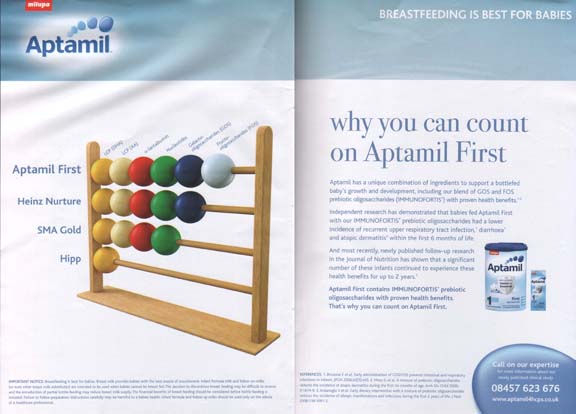
Recommendation of the Committee on the Convention on the Rights of the Child
The Committee, while appreciating the progress made in recent years in the promotion and support of breastfeeding in the State party...is concerned that implementation of the International Code of Marketing of Breastmilk Substitutes continues to be inadequate and that aggressive promotion of breastmilk substitutes remains common.... The Committee recommends that the State party implement fully the International Code of Marketing of Breastmilk Substitutes. (CRC to UK Sept ‘08)
- In an article in EU Food Law, (21.08.09) Danone queried the expert used by the ASA in its adjudication and said it would not be removing the claims from either its website or its product labels. The Trading Standards body (LACORS) said it may investigate taking enforcement action. The ASA has indicated that it may include websites in the near future.
Review of the UK law - wrong question, wrong answer
The UK Government appointed an Independent Review Panel to investigate the effectiveness of the formula marketing regulations that came into force at the beginning of 2008. After working for a year, commissioning research and requesting submissions, which Baby Milk Action and others supplied, the Panel published its draft report at the end of September. This concludes that the law does not need to be changed on the grounds mothers are not mistakenly feeding follow-on formula to babies instead of infant formula.
“What has that to do with the effectiveness of the regulations?” some may well ask. The purpose of the Infant Formula and Follow-on Formula Regulations, according to the Guidance Notes that accompany them, is to: “regulate labelling and restrict advertising and presentation of infant and follow-on formula so as not to discourage breastfeeding.”
The Panel was asked: “whether the new controls were fulfilling their objective or whether further action was needed, and if so, what future action may be appropriate.” We expected the panel to investigate if and how formula is being promoted through the internet, point-of-sale promotion, baby clubs, carelines, labels, health claims, advertising of follow-on formula and other marketing practices and whether these undermine breastfeeding and endanger babies fed on formula. We were assured that the investigation would be broad, and similar assurances were made in Parliament.
 The panel also requested an update of our Hard Sell Formula briefing paper outlining company marketing strategies and asked enforcement authorities for their views (see below). The report notes - but does not respond to - the examples provided. Instead it focuses on the mis-feeding of follow-on formula, although these products are now almost the same as infant formulas. The Panel is still working on the report and is due to submit it to the new Public Health Minister, Gillian Merron, in the New Year.
The panel also requested an update of our Hard Sell Formula briefing paper outlining company marketing strategies and asked enforcement authorities for their views (see below). The report notes - but does not respond to - the examples provided. Instead it focuses on the mis-feeding of follow-on formula, although these products are now almost the same as infant formulas. The Panel is still working on the report and is due to submit it to the new Public Health Minister, Gillian Merron, in the New Year.
Panel ignores views of those who have to enforce the Regulations
The draft report quotes the enforcement authorities, but then ignores the issues raised. For example:
LACORS said that they support the view that the same advertising, marketing and promotional controls that apply to infant formula should apply to follow-on formula. These extended controls should be framed so as to cover generic manufacturer names, logos and other pictorial devices in the same manner as those which currently apply to specific individual product names or logos where the likelihood of consumer readacross will occur.
In summary the ASA [Advertising Standards Authority] stated that common complaints about follow-on formula advertisements are that: they indirectly promote the use of infant formula; build general brand awareness and loyalty; denigrate breast feeding; exaggerate and distort the health and nutritional benefits of formula products.
LACORS was specifically asked “Are the 2007 Regulations clear and does this have an impact your ability to take action?” The draft report does not respond to the concerns raised, which include:
Certain websites contain information which would be prohibited if it were on a label or in an advertisement.
Certain claims (e.g. “gentle”, easy to digest”, “softer stools”) can be subjective in nature and it is difficult to draw the line between prohibited compositional claims, prohibited health claims and acceptable factual statement.
One of the major problems for enforcement officers is the use of advertising and promotional material which blurs the distinction between follow-on formula and infant formula. This is the case both in relation to the use of generic company logos and the use of infant imagery where it is difficult to determine the age of the infant. For example: the SMA logo (used in relation to both infant formula and follow-on formula) is closely associated by many consumers with infant formula and the stylised “M” pictorial can be closely associated with a breastfeeding mother.
Hear our questions to the Food Standard Agency Board online at www.food.gov.uk (see Q& A sections in July 08, Feb, July and Nov 09 meetings).
Malnutrition - a new market
Danone off GAIN Board but risks remain
Our campaign to have Danone removed from the Board of the UN Business Partnership, the Global Fund for Improved Nutrition (GAIN) (see Update 41) succeeded in July. However, Danone, Pepsico and other food companies still sit on GAIN’s Business Alliance Global Forum, benefitting from GAIN’s philanthropic image and its UN partners such as UNICEF. Although GAIN claims to promote breastfeeding, its market-led approach is helping food companies fuel a craze for fortified foods and micronutrients. Under the banner of ‘enlightened self interest’ and ‘wellness’ many are busily repositioning their products as health foods.1 Indeed Nestlé says in the Economist (29.10.09)2 “the defensiveness of the past is gone, Now we have a noble cause.” In the absence of strong national regulations in many countries, we wonder how GAIN will independently monitor and ensure the safety, quality & delivery of its industry initiatives or prevent attention being diverted from essential interventions like breastfeeding, access to clean, potable water, sanitation & sustainable complementary feeding?
1. Welfare Inc R.Nagarajan Times Insight Group (Times of India) Crest 24.10.09 http://m.timesofindia.com/PDATOI/articleshow/5156400.cms
2. The unrepentent chocolatier www.economist.com/displaystory.cfm?story_id=14744982
Industry influences national delegations
We are calling for all food industry representatives to come off government delegations to the global food standard setting body, Codex Alimentarius. Industry delegates can outnumber government delegates and can even lead delegations. At the Thai Codex Nutrition meeting in Nov 2006, of the 200 delegates over 100 were from industry, half of them on government delegations. We are also keeping a watch on GAIN, which now has Observer status at Codex - sitting right next to us in Nov 09, where it lobbied, through Ghana, for guidelines to “lessen impediments to international trade” in ‘formulated complementary foods.’
This will include branded fortified foods and supplements allegedly marketed for the prevention (not the cure) of malnutrition. In IRINNews, Stéphane Doyon, Médecins Sans Frontières expressed concern about patents: “The patents are so broad that if you add one micronutrient into a jar of Nutella [a widely distributed brand of nut pastes] it will fall within the patent.”3 A briefing on the new foods will be available as a download ASAP.
3. Making peanut butter gets stickier www.irinnews.org/report.aspx?ReportID=86979
GSK PUSHING MICRONUTRIENTS and obesity in India
We spoke at the Global Conference on Meeting Nutritional Challenges with Sustainability and Equity in Delhi in August, alongside Vandana Shiva and Marion Nestle who showed how companies are pushing micronutrients in junk foods.

A Pre-School Guide for Parents, that we picked up in Delhi, contains 52 pages of adverts with claims such as: “Lack of micronutrients in young children can delay language development” (see above). Because the ‘right’ answers in an accompanying quiz are unattainable, parents will get a low score. Their children will be ‘picky eaters’ in need of Glaxo Smith Kline’s very sweet Junior Horlicks every day. A web promotion for Mothers Horlicks claims that “DHA is not easily available from average indian Diet.” The DHA is made by Martek.
For the People’s Charter for Food and Nutrition Security see: www.ibfanasia.org/gc/Peoples-Charter-for-Food-and-Nutrition-Security.pdf
Policy changes in the United States
California WIC and the saturated market
US income differentials are the widest of any industrialised country and the USA ranks 43rd lowest Infant Mortality Rate (The Spirit Level, Wilson R, Picket K, 2009 Greater equality and better health. www.bmj.com/cgi/content/full/339/nov10_2/b4320nov10_2/b4320).
The US Special Supplemental Nutrition Programme for Women Infants and Children (WIC) launched in 1974, is targeted to improve the nutrition of the poor and serves close to nine million women and children. It is the nation’s largest single purchaser of infant formula, buying 60% of all US formula. In the last decade WIC has raised breastfeeding initiation rates among low-income ethnic women, but exclusive breastfeeding and duration rates remain much lower amongst WIC mothers - indeed only 18% of WIC mothers in California are still breastfeeding after the first three months. WIC is trying to change this and from October 1st has stopped routine supply of any formula during Month One, with exclusive breastfeeding becoming the ‘default’ option and formula offered only after an individual assessment and counselling session. Mothers have a financial incentive to choose exclusive breastfeeding with a much-enhanced food package worth $62 a month for a full year, plus $38 a month for her child. Those who choose “mostly breastfeeding” receive $49 plus $21 for their child. Those who choose the formula package receive $38 (for 6 months), and $21 for infants. Early reports from the field are very positive.
- Lack of regulation in the US has resulted in a ‘mature’ (saturated) market for formula. Manufacturers increase profitability by raising prices and using health claims for ‘designer’ products, touted as “closer than ever to breast milk.” WIC is forced to pay $100m to $200m annually for ingredients which have no proven health benefits and many risks. The WIC and breastfeeding community is urging the Food and Drug Aministration and Federal Trade Commission to toughen its approach and clamp down on direct marketing and health claims, and wants Congress to hold hearings on this in 2010.
- No Maternity legislation Another problem is that no US federal law requires paid maternity leave; 24 % of the best employers provide four or fewer weeks, 52 % provide six weeks or less – especially low-wage employers. www.calwic.org/docs/federal/2009/formulamarketing.pdf
- Patti Rundall, our Policy Director, spoke at the 5th Biennial Childhood Obesity Conference in Los Angeles in June, invited by California WIC and the Strategic Alliance for Healthy Food and Activity Environments. http://preventioninstitute.org/index.html
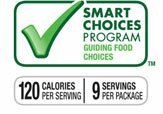 Governments wanting to tackle the obesity problem are wondering whether to regulate the marketing and labelling of junk foods or to trust the many industry self-regulation schemes that are springing up. In the USA, state and federal authorities have put pressure on the food industry to end its voluntary Smart Choices labelling scheme which allows a green checkmark on products that meet its very low nutritional criteria.
Governments wanting to tackle the obesity problem are wondering whether to regulate the marketing and labelling of junk foods or to trust the many industry self-regulation schemes that are springing up. In the USA, state and federal authorities have put pressure on the food industry to end its voluntary Smart Choices labelling scheme which allows a green checkmark on products that meet its very low nutritional criteria.
The industry strategy to head off regulation seems to have backfired and the Food and Drug Administration is now devising regulations for package front nutrition labeling (hopefully the much simpler Traffic Light scheme advocated by the UK Food Standards Agency). With no EU-wide regulation on marketing of junk foods to children, EU-based food companies have devised a weak voluntary scheme - the EU Pledge - also with low criteria and many loopholes.
One way to raise funds for health programmes is through taxation of alcohol or junk foods. In the US a 1penny per ounce tax on sodas would raise about $150 bn and save health costs of at least $50 bn over a decade. The Thai Sin Tax on alcohol and tobacco already raises $100m per year for ThaiHealth Promotion. See Page 14 and: http://articles.latimes.com/2009/oct/06/opinion/oe-brownell6 and http://en.thaihealth.or.th
The California SIDS Advisory Council has unanimously recommended that the California Department of Public Health include breastfeeding as a SIDS Risk Reduction recommendation.
Industry fights rearguard action against regulation
In its latest analysis of the global baby food market, Euromonitor International states: “Government Regulation a Growing Constraint”. It continues: “There are significant international variations in the regulations governing the marketing of milk formula, which are reflected in sales differences across countries.”
There could be no clearer indication that restricting marketing protects breastfeeding, so limiting market growth. “The industry is fighting a rearguard action against regulation on a country-by-country basis,” Euromonitor reports.
Under-resourced public interest organisations will be encouraged to learn that the transnational baby food companies are on the back foot, but concerned at this confirmation that the industry response to the World Health Assembly marketing requirements is to fight against them being implemented in regulations.
Euromonitor highlights the impact of differing regulatory systems: “The huge disparity in the retail value of milk formula sales between China and India is mainly due to the significant differences between their official regulatory regimes.” It notes: “In India, all advertising is prohibited, while in China, TV advertising and the use of celebrity spokespeople are allowed.”
Most growth in the market is in the Asia-Pacific region with China the ‘star performer’, with formula sales predicted to have grown by 26% in 2008.
Sales of toddler milks, said to be an industry priority because their promotion is less regulated, are predicted to grow by 31%.
In industrialised countries the industry focus is on increasing value growth as well as volumes, through the promotion of added ingredients such as DHA and ARA (Long Chain Polyunsaturated Fatty Acids) and ‘probiotics’. Promotion of breastfeeding is a concern to the industry, even in the US where formula advertising is unregulated: “The rising popularity of breast feeding and a low birth rate will combine to drag North American retail value growth down by a percentage point in 2008, to 5.9%.”
Nestlé’s share of the global baby milk and baby food market is given as 26% following its takeover of Gerber, with Danone in second place on 14% following its takeover of the NUMICO brands (Nutricia, Milupa/Aptamil, Cow & Gate).
Organic baby foods are seen as a significant marketing strategy, but Euromonitor acknowledges: “In Western Europe, most parents are unaware that, as a result of stringent EU regulations on permitted levels of pesticide residues in baby food, there is very little difference between regular and organic baby food.”
The internet is portrayed as a major marketing opportunity for developing countries. IBFAN has recorded how companies attempt to sign parents up to ‘Baby Clubs’. We have also highlighted the new strategy of promoting ‘good night milk’. As Euromonitor says: “With an increasing number of mothers returning to work after giving birth, products that help babies sleep better could have a wide appeal.”
The Euromonitor report Global Packaged Food: Market Opportunities for Baby Food to 2013 is available at: euromonitor.com
Datamonitor: Build brand loyalty early
“Mothers are returning to a more traditional parenting technique of breastfeeding their children. This presents problems for the baby drinks industry, with the growth of formulas stunted as a consequence. Manufacturers must find ways of creating appeal without positioning drinks as a direct alternative, which creates ill-feeling among mothers.
“Marketers are becoming more aware of the need to target parents as early as possible. Brand relationships and trust bonds can be formed during pregnancy when the child is not yet even born. This lifestage targeting will becoming increasingly important going forwards.”
Babies and Toddlers: Emerging Opportunities. datamonitor.com
What has the Gates Foundation done for global health?
For an audio recording of this interesting Royal Society of Arts and Lancet debate in May see: www.thersa.org/events/?a=203772
The Lancet, Vol 373, Issue 9675, p1577, 9.5.09
Celebrating 30 years of protecting infant health
In a letter published in the journal of the Royal Society of Speech and Language Therapists in September 2009, Nestlé stated: “In 1981, Nestlé took part in devising the World Health Organisation Code, which recommends to companies how they are allowed to market infant formula.”
The statement is wrong in several respects. For a start, it was in 1979 that WHO and UNICEF called a meeting that began the process of drafting the International Code of Marketing of Breastmilk Substitutes. Nestlé was present - indeed Nestlé’s Ernest Saunders was the President of the International Council of Infant Food Industries - but it obstructed the process from the start and described the final draft Code as “unacceptable” and “irrelevant and unworkable”.
As Nestlé attempts to re-write history, it is important to remember what really happened. Representatives of WHO, UNICEF and civil society organisations gathered in Geneva on 12 October 2009 to celebrate the 30th anniversary of the International Baby Food Action Network (IBFAN) and recall how the Code came about.
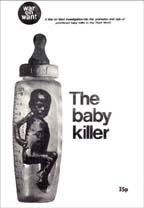 Six civil society groups at the first drafting meeting formed IBFAN to coordinate their efforts to protect infant health. Today there are more than 200 groups in over 100 countries. At the celebrations in Geneva representatives came from 24 European countries, plus the Coordinator of IBFAN Africa. A special guest was Andrew Chetley, who was working for War on Want (part of the Baby Milk Action Coalition) in 1979 and had earlier designed the cover of The Baby Killer (follow link to download pdf) published in 1974.
Six civil society groups at the first drafting meeting formed IBFAN to coordinate their efforts to protect infant health. Today there are more than 200 groups in over 100 countries. At the celebrations in Geneva representatives came from 24 European countries, plus the Coordinator of IBFAN Africa. A special guest was Andrew Chetley, who was working for War on Want (part of the Baby Milk Action Coalition) in 1979 and had earlier designed the cover of The Baby Killer (follow link to download pdf) published in 1974.Nestlé sued the Swiss publishers of this exposé of its formula marketing practices when they translated the title into German as Nestlé kills babies. The trial was a Public Relations disaster for Nestlé as experts trouped into court to substantiate the claims in the booklet. Nestlé eventually dropped all challenges, except that against the German title. Token fines were awarded to Nestlé, on the grounds it was not committing deliberate murder, but the judge warned it to change its marketing practices. but the judge warned it to change its marketing practices.
 The publicity led to the Nestlé boycott in 1977 and a Senate hearing called by Senator Edward Kennedy in 1978 (click here for a video clip), where he grilled company executives. Famously Nestlé stated it had no responsibility if people were using its formula in conditions that led to their babies dying.
The publicity led to the Nestlé boycott in 1977 and a Senate hearing called by Senator Edward Kennedy in 1978 (click here for a video clip), where he grilled company executives. Famously Nestlé stated it had no responsibility if people were using its formula in conditions that led to their babies dying.
Following these hearings, Senator Kennedy (who passed away in September 2009) and others called for an international marketing code, and in 1979 WHO/UNICEF convened the landmark meeting which lead to the Code’s formation. The Code was adopted in 1981 despite the industry’s best efforts and the USA voting against. It took until 1994 for the USA to give its support for the Code, supporting the Resolution in that year that recalled the Code, and other Resolutions since.
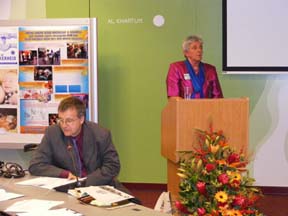 IBFAN has grown and works to implement the Code and subsequent, relevant Resolutions in national measures. Annelies Allain, Director of IBFAN’s International Code Documentation Centre and a founder member of IBFAN (pictured left with Andy Chetley), has led efforts to train policy makers on the measures. Ellen Sokol, author of The Code Handbook, the authoritative text on implementation, was also present at the celebration. Also present was Dr Halfdan Mahler, Director General of WHO from 1978 to 1988, who played a hugely important role in the Code’s formation.
IBFAN has grown and works to implement the Code and subsequent, relevant Resolutions in national measures. Annelies Allain, Director of IBFAN’s International Code Documentation Centre and a founder member of IBFAN (pictured left with Andy Chetley), has led efforts to train policy makers on the measures. Ellen Sokol, author of The Code Handbook, the authoritative text on implementation, was also present at the celebration. Also present was Dr Halfdan Mahler, Director General of WHO from 1978 to 1988, who played a hugely important role in the Code’s formation.
Annelies launched the latest State of the Code by Country report, showing that 63 countries have implemented most or many of the provisions of the Code and Resolutions. This does not include the majority of the European Union countries which have been down graded to having only some provisions in legislation.
Key-note speaker, Prof. Zulfiqar A. Bhutta (coauthor Child Survival series in The Lancet and of The Aga Khan University, Pakistan) related the latest statistics and the importance of community interventions to support breastfeeding in Pakistan.
Messages of support
“War on Want is proud to have been one of the first organisations to lead the fight against multinational baby food companies. Our 1974 report,‘The Baby Killer’, drew attention to the irresponsible promotion of breastmilk substitutes in the developing world, and its devastating impact on child health. War on Want congratulates IBFAN on maintaining the struggle over the past 30 years. May we and all the world’s children see many more victories in the years to come.”
John Hilary, Exec Director, War on Want
“IBFAN has done a tremendous job in the promotion and protection of breastfeeding in the last 30 years. Congratulations on your birthday!”
Jasmine Whitbread, Chief Executive, Save the Children UK
“The CPHVA is proud to have had such a long association with IBFAN, the Baby Feeding Law group and to have endorsed the Nestle Boycott.”
Angela Roberts, Chair NPC CPHVA/Unite.
IBFAN’s experience
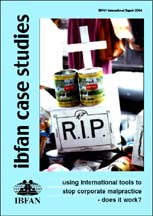 The 2004 report Checks and Balances in the Global Economy: Using international tools to stop corporate malpractice - does it work? examined 7 cases-study countries and found the industry lobbied aggressively against regulations.
The 2004 report Checks and Balances in the Global Economy: Using international tools to stop corporate malpractice - does it work? examined 7 cases-study countries and found the industry lobbied aggressively against regulations.
In some countries the industry lobby won through, but in others civil society organisations succeeded in protecting infant health. Provides useful lessons to others. (Where industry won, there are still useful lessons to be learned.)
IBFAN Europe meeting
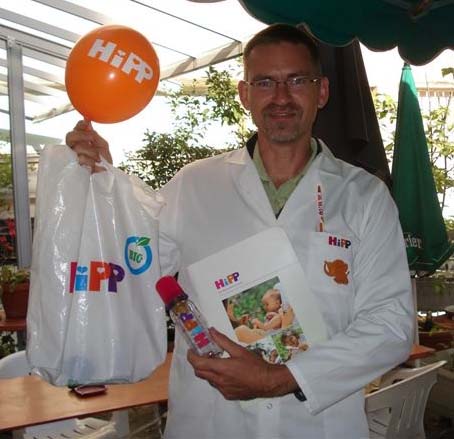 European IBFAN groups held their meeting after the celebration, sharing experiences and the latest information on infant feeding. Eastern Europe is, once again, a concern. Hipp, the German formula company even appears to sponsor doctors.
European IBFAN groups held their meeting after the celebration, sharing experiences and the latest information on infant feeding. Eastern Europe is, once again, a concern. Hipp, the German formula company even appears to sponsor doctors.
Left: Baby Milk Action’s Mike Brady wearing a Hipp doctor coat.






